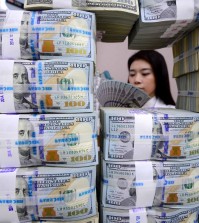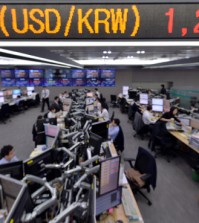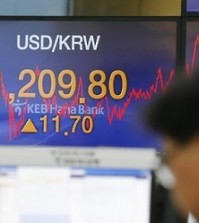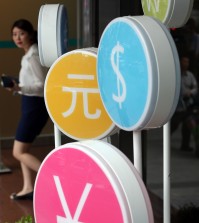- California Assembly OKs highest minimum wage in nation
- S. Korea unveils first graphic cigarette warnings
- US joins with South Korea, Japan in bid to deter North Korea
- LPGA golfer Chun In-gee finally back in action
- S. Korea won’t be top seed in final World Cup qualification round
- US men’s soccer misses 2nd straight Olympics
- US back on track in qualifying with 4-0 win over Guatemala
- High-intensity workout injuries spawn cottage industry
- CDC expands range of Zika mosquitoes into parts of Northeast
- Who knew? ‘The Walking Dead’ is helping families connect
Korean won rises to 69-month high against dollar
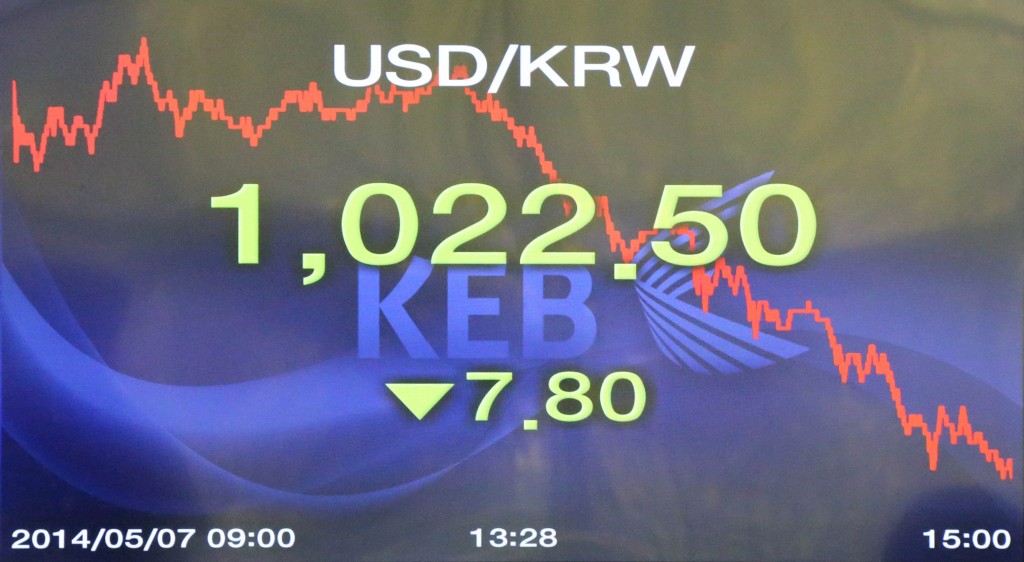
The won ended at 1,022.5 per dollar, the strongest it has been in five years and nine months. (Yonhap)
SEOUL, May 7 (Yonhap) — The Korean currency rose to its highest in more than five years against the U.S. dollar on Wednesday on the back of the greenback’s weakness against major currencies and exporters’ dollar sales from brisk exports.
The local currency closed at 1,022.50 won against the greenback, up 7.8 won from the previous session’s close.
It marked the highest level since Aug. 7, 2008 when the local currency hit 1,016.50 won per the dollar.
Finance Minister Hyun Oh-seok said the government will closely monitor herd behaviors in the currency market.
“It is hard to comment on the foreign exchange rate’s level or the pace, but the government will closely monitor any one-sided behavior,” Hyun told reporters in Sejong City.
The won’s gain came as the dollar depreciated against major currencies on weaker-than-expected U.S. economic growth for the first quarter. Exporters also unloaded the greenback as Seoul’s exports remained robust in April, experts said.
“The greenback weakened as data on the first-quarter economic growth in the U.S. was softer than expected and the euro gained ground as prospects for a rate cut eased,” said Jeon Seung-ji, a currency analyst at Samsung Futures Co.
She said that foreign exchange authorities may intervene in the market to prevent the won from breaching the 1,020 won level.
South Korea logged a current account surplus for the 25th straight month in March as exports remained firm. The central bank forecast that the 2014 surplus will reach US$68 billion following a record $79.88 billion in 2013.
The current account surplus lent support to the Korean currency, which has appreciated 3.22 percent to the dollar so far this year.
Bank of Korea Gov. Lee Ju-yeol recently said it is worrisome that the current account surplus has expanded, adding that one of the challenges of a bigger surplus is its impact on the foreign exchange rate.
Experts said that it may be difficult for the Korean won to fast appreciate against the dollar due to caution against interventions by FX authorities and demand for the dollar from importers settling transactions.
“The pace of the won’s gain may ease due to market players’ caution against the intervention,” said Sohn Eun-jung, a currency analyst at Woori Futures Co.
But some analysts say that the local currency may rise to breach the 1,000 level this year, given the underlying trend of the current account surplus.








